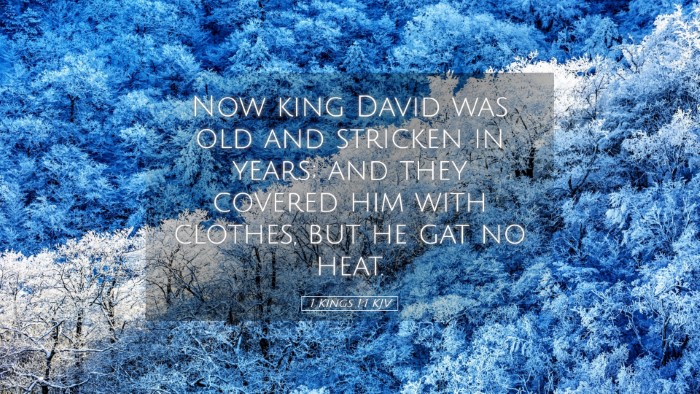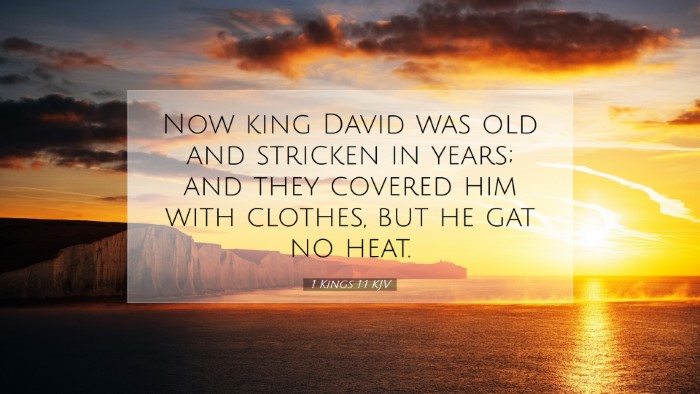Commentary on 1 Kings 1:1
Verse: 1 Kings 1:1 - "Now king David was old and stricken in years; and they covered him with clothes, but he got no heat."
This verse serves as the introductory passage of the book of 1 Kings, presenting an important moment in Israel's history. The context here deals with the aging king David and the implications of his frailty for the future of the monarchy and the nation of Israel.
Analysis of the Text
This verse conveys several critical themes and insights, significant for pastors and scholars alike:
-
The Condition of King David:
David’s old age is emphasized. His physical state reflects not only his personal decline but also the spiritual and national condition of Israel at this time. As Matthew Henry notes, "The age of David, though a time of glory, is now a time of decline." This serves as a somber reminder of the transient nature of power and life.
-
Symbolic Covering:
The act of covering David signifies the attempts to maintain his dignity and status despite his failing health. Adam Clarke reflects on this action, suggesting that it represents both a physical need for warmth and a deeper need for respect. The king’s inability to be warmed by these coverings symbolizes a deeper disconnect between the once-vibrant leadership and his current helpless state.
-
Prophetic Foreshadowing:
Henry further posits that this initial verse foreshadows the strife that will soon unfold with Adonijah's attempt to seize the throne. The decline of David inevitably leads to chaos, as the succession of leadership becomes a vital concern for Israel.
Historical Context
Understanding this passage requires a look at the socio-political backdrop of Israel. Albert Barnes provides insight into the turbulent nature of David's latter years, suggesting that political instability accompanied his aging. There were factions within Israel that desired change, making David’s waning strength particularly precarious for the nation.
David’s Legacy:
David leaves behind a mixed legacy: a man after God's own heart, yet also the perpetrator of significant moral failures. As students of theology consider this, they are reminded that leadership and divine favor do not guarantee personal righteousness or unblemished legacy.
Theological Implications
1 Kings 1:1 serves as a reflection on the nature of human authority. It urges the believer to recognize that all human leaders are subject to decline, and true stability can only be found in God. Both Barnes and Clarke emphasize that regardless of human efforts to maintain control and respect, ultimately, sovereignty belongs to God alone.
- Transition of Power:
The deterioration of King David parallels the concerns around succession that arise later in the chapter. The importance of divine guidance during times of transition is a principal theme that emerges from this passage.
- Human Fragility:
David's frailty is symbolic of the human condition. Even the mightiest will one day face decline. This reality urges believers to place hope and reliance not on human leaders but in the eternal King, Christ.
Practical Applications
This commentary encourages application in various ministry contexts:
- Pastoral Care: Understanding the vulnerabilities of leadership can help pastors provide support for their leaders and recognize their own limitations.
- Leadership Training: Future leaders should be taught about the significance of humility and reliance on God for their capabilities and calling.
- Encouragement for the Congregation: The church community must be reminded that God is sovereign, even when leadership transitions occur.
Conclusion
1 Kings 1:1 acts as a poignant reminder of the realities of life and leadership. As David faces the twilight of his reign, the importance of divine sovereignty becomes ever more pronounced. Each scholar and pastor interpreting this text should ponder not only the historical implications but also the personal applications for their lives and ministries. David's decline foreshadows the chaos that follows in his absence, ultimately leading to the timely intervention of divine grace and governance from God.


